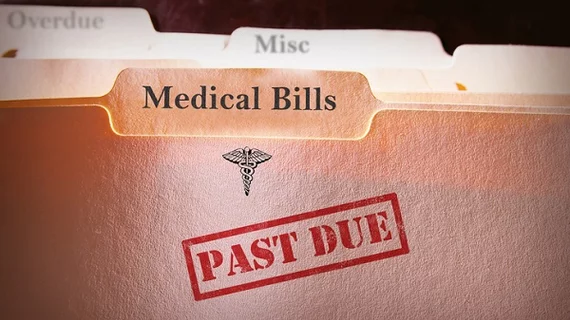Radiology Partners leader suggests 4 ways to fix the ‘dysfunctional’ No Surprises Act
There are four ways to potentially begin fixing chaos created by the No Surprises Act, a leader with Radiology Partners contends in a new editorial.
HHS Secretary Xavier Becerra recently testified to Congress about the legislation, which is aimed at protecting patients from receiving unexpected bills for out-of-network care. One Senator labeled the law’s rollout as a “big mess,” noting a building backlog of arbitration cases with some practices waiting more than six months to receive payment.
Radiologist Richard E. Heller, MD, MBA, highlighted these challenges in an opinion piece published by Medpage on April 26.
“The dysfunctional No Surprises Act process is adding burden and expense for medical practices, redirecting resources that would be better invested in the care of patients,” wrote Heller, who is the associate chief medical officer for health policy and communications at Rad Partners and a member of the RSNA Board of Directors. “The process is also adding administrative cost to the U.S. healthcare system.”
He suggested four possible fixes to address challenges posed by the NSA:
1. Reducing the need for arbitration: Heller said this can be accomplished by creating a more “balanced” process for settling payer-provider disputes. Doing so would require considering several factors for reaching a reimbursement rate, and not just the nontransparent “qualifying payment amount” calculated by insurers.
2. Limiting the number of submissions: The federal government has placed restrictions around providers’ ability to batch together claims into a single dispute submission. Heller suggested removing these “unnecessary limits,” reducing the need to pay fees for several similar claims while bolstering access to the process.
3. Requiring insurers to indicate claim eligibility: Physicians have faced difficulties determining whether claims are eligible for arbitration, Heller noted. A federal report indicated that this has been one of the main drivers of delays. Authorities could fix this bottleneck by mandating that payers indicate claim eligibility.
4. Enforce timely and complete payment: When a medical practice prevails in arbitration, the feds should be able to force payers to cough up the money to avoid such lengthy delays. The law includes language allowing the administration to enforce timely and complete payment, Heller noted, and penalties should be enforced for noncompliance.
“The No Surprises Act was passed to end surprise billing while protecting access to care,” he concluded. “The difficulties outlined in the Congressional hearings and the Departments' report are largely due to choices made in rulemaking and can be addressed through further rulemaking.”
Read the entire editorial, along with previous coverage of the No Surprises Act (including how it has impacted RP's margins), below.

